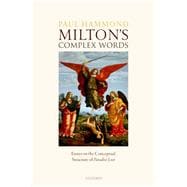Every major poet or philosopher develops their own distinctive semantic field around those terms which matter most to them, or which contribute most profoundly to the imagined world of a particular work. This book explores the specific meanings which Milton develops around key words in Paradise Lost.
Some of these are theological or philosophical terms (e.g. 'evil', 'grace', 'reason'); others are words which shape the imagined world of the poem (e.g. 'dark', 'fall', 'within'); yet others are small words or even prefixes which subtly move the argument in new directions (e.g. 'if', 'not', 're-'). Milton seems to expect his readers to be alert to the special semantic field which he creates around such words, often by infusing them with biblical and literary connotations, and activating their etymological roots; alert also to the patterns created by the repetitions of such words, and particularly to their diverse use (and often their blatant misuse) by different characters. To understand the migrations and malleability of key words is part of the education of Milton's reader.








